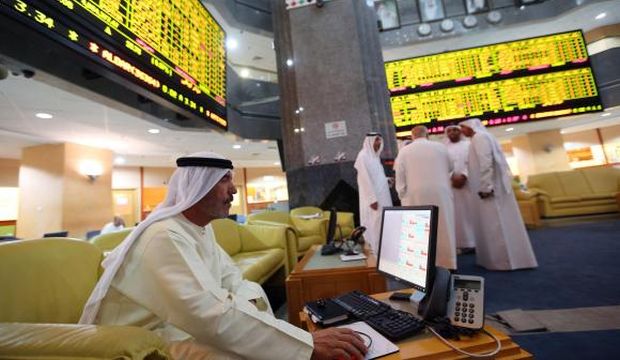
An investor monitors a screen displaying stock information at the Abu Dhabi Securities Exchange on June 25, 2014. (Reuters/Stringer)
Abu Dhabi, Reuters—A planned merger of the Dubai Financial Market (DFM) and the Abu Dhabi Securities Exchange (ADX) has been shelved for the foreseeable future as terms for the politically sensitive move could not be agreed, sources told Reuters on Thursday.
Having been mooted for a number of years, a merger of the DFM and the ADX seemed to take an important step closer last year as investment banks were hired to advise on a tie-up —a move revealed by Reuters last October.
The state-backed deal, seen as one of the biggest changes in the country’s financial industry in recent years, was expected to energize financial markets in the United Arab Emirates, making it easier for investors to operate across the markets, stimulating trade and attracting more foreign investment.
However, despite a number of key impediments being overcome since then, talks have stalled and a deal is now unlikely to happen any time soon.
“It’s been shelved,” said one Abu Dhabi-based banking source aware of the matter, adding that reaching an agreement was always going to be tricky given multiple points of contention, such as valuations, the location of the merged entity’s headquarters, and the board’s composition.
A spokesman for the Abu Dhabi Executive Council, the top policymaking body in the emirate which mandated Abu Dhabi’s advisers, did not respond to calls and an email seeking comment. Spokesmen for the ADX and DFM declined to comment.
The sources, who all spoke on condition of anonymity as the information isn’t public, said it was unclear whether the merger plans were permanently on hold or whether they would be revived later.
The valuation of the DFM, the Gulf’s only listed bourse, has increased significantly since the advisers were first appointed, as trading increased during a bull run which saw the value of Dubai’s benchmark index jump 59.5 percent between January 1 and May 6.
Based on a valuation of around 20 times earnings before interest, tax, depreciation and amortization (EBITDA) used under the merger plan, the DFM’s value rose from around 2 billion Emirati dirhams (545 million US dollars) at the end of last September to 4.64 billion dirhams (1.26 billion dollars) at the end of March.
The merger plan valuation, conducted by Goldman Sachs, according to two of the sources, put ADX at about 10–12 times EBITDA.
“They are engaged, the marriage would be good but the dowry is the problem— Dubai is expensive,” said Mohammed Ali Yasin, head of National Bank of Abu Dhabi’s brokerage subsidiary.
Political considerations were always a big obstacle to be overcome, as they are in many mergers in the Gulf Arab region. Despite economic pressures for consolidation in a number of industries, powerful shareholders are often reluctant to cede control in their businesses and be seen to be losing face—in this case, both emirates wanted the prestige of running their own bourses.
But the appointment of advisers for a stock market tie-up, as well as the merging of Abu Dhabi and Dubai’s separate aluminum businesses into Emirates Global Aluminum last year, raised hopes of a new era of cooperation.
In April this year, a top Dubai economic policymaker said that an agreement to merge the two markets had been reached in principle but was yet to be finalized.
But the impetus at a political level has seemingly waned.
“For the moment it is on hold. The decision makers are waiting for a better time and to make a thorough assessment on some key issues,” a second source familiar with the matter said, without elaborating on what the key issues were.
Analysts are optimistic the merger will eventually happen.
“It should not hinge on valuations, profit or loss and such things. It is a matter of national strategy and national economic interests,” said Wadah Al-Taha, chief investment officer at Dubai-based Al Zarooni Group.
“It will happen, if not now, later. It will be politically driven and forced to happen.”
Abu Dhabi, the richest emirate in the UAE, had hired US investment bank JP Morgan Chase and local lender First Gulf Bank to advise on the merger.
Investment Corporation of Dubai, the flagship holding company which owns stakes in many of Dubai’s top entities, including DFM’s parent, Borse Dubai, had hired Citigroup.
